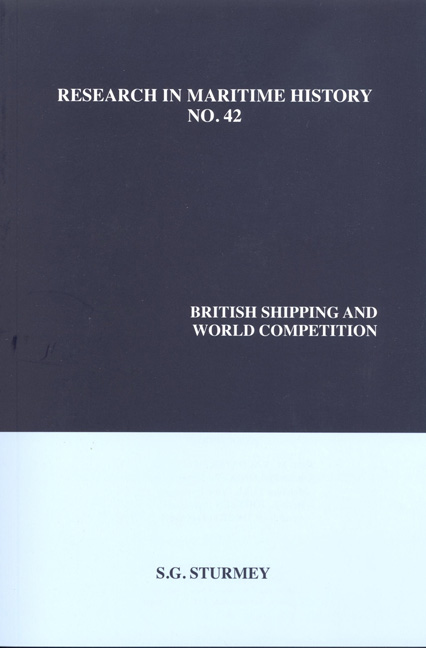Book contents
- Frontmatter
- Table of Contents
- Series Editor's Foreword
- About the Author
- Preface
- Figures and Tables
- Chapter 1 The Problem Defined
- Chapter 2 High Water: The Pre-1914 Period
- Chapter 3 War and Reconstruction
- Chapter 4 The Troubled Years: The Interwar Period
- Chapter 5 Nationalism in Shipping in the Interwar Years
- Chapter 6 The Birth of the Liberty
- Chapter 7 The Prosperous Age: The Postwar Period
- Chapter 8 Enemies of Competition in the Postwar Years
- Chapter 9 Flags of Convenience
- Chapter 10 Economics of Shipping Enterprises
- Chapter 11 Shipowning and Resource Allocation
- Chapter 12 Labour Relations and Labour Costs (by Basil Mogridge)
- Chapter 13 The Conference System
- Chapter 14 The Structure of the British Industry
- Chapter 15 The Question Answered
- Epilogue The Future
- Appendix The Contribution of British Shipping to the Balance of Payments
- Bibliography
- Index
Chapter 1 - The Problem Defined
- Frontmatter
- Table of Contents
- Series Editor's Foreword
- About the Author
- Preface
- Figures and Tables
- Chapter 1 The Problem Defined
- Chapter 2 High Water: The Pre-1914 Period
- Chapter 3 War and Reconstruction
- Chapter 4 The Troubled Years: The Interwar Period
- Chapter 5 Nationalism in Shipping in the Interwar Years
- Chapter 6 The Birth of the Liberty
- Chapter 7 The Prosperous Age: The Postwar Period
- Chapter 8 Enemies of Competition in the Postwar Years
- Chapter 9 Flags of Convenience
- Chapter 10 Economics of Shipping Enterprises
- Chapter 11 Shipowning and Resource Allocation
- Chapter 12 Labour Relations and Labour Costs (by Basil Mogridge)
- Chapter 13 The Conference System
- Chapter 14 The Structure of the British Industry
- Chapter 15 The Question Answered
- Epilogue The Future
- Appendix The Contribution of British Shipping to the Balance of Payments
- Bibliography
- Index
Summary
The primary object of this book is to answer a single question, namely, why has the tonnage of ships registered in the United Kingdom declined from over forty-five percent of the world total in 1900 to about sixteen percent of that total in 1960? This period has been chosen and only incidental attention paid to the nineteenth century because it was after 1900 that international competition to British shipping as a while became more important than competition within British shipping. There is no fixed date at which this change occurred, and in some trades - for example, the North Atlantic - competition was international after about 1870; in fact, German competition for mail tenders was the immediate cause of reductions in transatlantic postage rates in the third quarter of the nineteenth century. It is nevertheless true to say that from about 1850 until the early years of the twentieth century British shipping faced comparatively little international competition whereas in subsequent years such competition grew in intensity. The question posed above is therefore concerned with the nature of the competitive challenge and the response elicited from the British industry; the statistical consequence of this process of challenge and response is the relative decline noted.
There are four possible answers to the question posed in the preceding paragraph. First, the answer might be found in changes in the underlying competitive situation arising from changes in the economic factors affecting the operation of shipping. Second, interferences with the competitive process might have caused the relative decline; that is, even if Britain possessed economic advantages in the provision of shipping services, state action in other countries might have prevented these advantages from being effective. Third, the answer might be seen to lie in random factors, such as wars with subsequent repercussions, trade changes or government policies other than those directed specifically to assisting shipping. Fourth, the answer might be found in the reactions of the British shipping industry as a whole to changing circumstances; that is, there might have been internal constraints on growth which were sufficient to produce the situation outlined in the question.
The four approaches to an answer to the question are quite distinct.
- Type
- Chapter
- Information
- British Shipping and World Competition , pp. 1 - 10Publisher: Liverpool University PressPrint publication year: 2009

